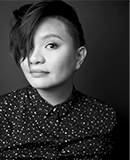
“Nothing can be by itself alone, no one can be by himself or herself alone, everyone has to inter-be with everyone else. That is why, when you look outside, around you, you can see yourself.”
—Thich Nhat Hanh
Achokayis might seem alone onstage. But the reality is that even in a one-person show, the act of theatre and storytelling can galvanize a community into the story so that we are not only witnessing but become active participants in the listening. In Where We Belong, Achokayis tells us the stories of her ancestors and the echoes of their journeys across the ocean, and through telling those, reveal her own as well. The audience in this story is of utmost importance. When Where We Belong premiered at Shakespeare’s Globe in London at the Origins Festival in 2019, the ears of the audience belonged to the writer’s mother, father, and many other characters written about: the professors from her PhD program, the academic at the British Museum, and just across the way at Southwark Cathedral, her ancestor Mahomet Weyonomon’s spirit, listening as well. They could hear and see themselves in her story quite literally. Since then, the story has been told across the United States, including New York City, Chicago, Seattle, Philadelphia, Hudson Valley, Baltimore, Portland, Colorado, and now finally arriving in Ashland, Oregon. In all of those places, and now here, the question still remains: Who will hear now, and what will they see in themselves?
Each time I’ve worked on Where We Belong in the past 5 years, I’ve heard something new. As I change, the story reaches some new place in me. The story has played a part of my own becoming. Inside my colonized Singaporean self born into a conservative Christian family, I am reminded how the places we were born from are the very places we need to question, to heal, to interrogate, and celebrate. And this time, as part of OSF’s season of love, I think about the how the play holds such complexity of love: the love of Shakespeare’s language even while it was used to violently assimilate, and how to hold those truths together.
So now. Here you are. The next ears to the story. When we listen we are needed; it is a fully engaged relationship. How will you become? How will you see yourself?
—Mei Ann Teo